by Jocelyn Watkin | Sep 15, 2021 | Information

Jocelyn teaches you from her online tai chi studio
Wouldn’t it be awesome if you could learn tai chi from me without having to leave home? Totally awesome and don’t just dream about it.
Vaccination for Covid-19 is not required as this course is completed online in your own space.
My new online course, called “Tai Chi for Strength, Balance and Mobility”, has received an enthusiastic thumbs up from participants who ‘test drove’ it.
It is now available so you can learn from me at any time that suits you, 24 hours per day, 7 days per week and anywhere you have computer, tablet or mobile phone.
If you want to live stronger for longer with better strength, balance and mobility, please enroll using this link: https://navigatinghealthcare.co.nz/programs/#Tai-Chi-for-Strength-Balance-Mobility
This course has six modules, each designed to be comfortably completed within one week. However, you can take longer if you like. There are easy-to-read articles and how-to videos where I show you the movements step-by-step and share the secrets of tai chi. It will be like I am right there in your home with you.
I am a qualified, premier instructor for the Tai Chi for Health Institute. Find out why I can help you learn tai chi that is safe, easy-to-learn and effective: https://www.kiaorataichi.nz/about-us/
The course is ideal for anyone who:
- is worried about their balance or who wants to help a family member or friend to improve their balance.
- wants to get fitter and stronger.
- needs something that truly helps to manage and reduce stress.
- would love a good night’s sleep.
- is curious about tai chi and how it works for strength, balance and mobility.
- is an instructor teaching tai chi for fall prevention or strength & balance classes
One participant said of the course: “The special breathing I learned has helped me de-stress and calm down. It feels like a weight off my chest and shoulders”.
Can you imagine how blissful it would be to fall into a deep slumber almost as soon as your head hits the pillow? During this course, you’ll learn calming meditative breathing that you can use anywhere and anytime you feel stressed or worried, especially just before you go to bed. Click here if you’re looking for sweet dreams
Wouldn’t it be a relief to help a friend or family member improve their balance so you no longer worry about them having a fall and getting hurt? It sure would. Click here to help that special someone to stand tall and with good balance.
How amazing would it be if you could live stronger for longer? Totally! You’ll have access to the videos and articles for at least six months so you can regularly practice and build more strength and balance. Click here if you want to become more mobile and for years longer.
Sabine, a qualified Tai Chi for Health instructor recommends this course: Thank you Jocelyn, for a very enjoyable course. I loved the step-by-step approach and I could feel the improvement of my core strength, breathing and posture. Safety was top priority through the whole course and it was achieved with very clear and easy instructions. Overall, a wonderful experience.
All this and more with my new Tai Chi for Strength, Balance and Mobility course… and you won’t have to go out on a wintry wet night to learn it. You can participate in the privacy and warmth of your own home.
For just $99 you’ll receive:
- The full online course of six sessions, with supporting articles and how-to learning videos, which are delivered to your email inbox once per week.
- Additional resources of a practice journal and checklist.
- Access to a client portal where you can ask questions and share experiences each week.
If you want to live stronger for longer with better strength, balance and mobility, please enroll using this link: https://navigatinghealthcare.co.nz/programs/#Tai-Chi-for-Strength-Balance-Mobility
by Jocelyn Watkin | Sep 17, 2020 | Information
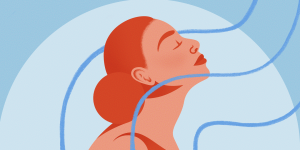 Breathing – we all do it automatically: approximately 18 times per minute, 1,080 times per hour and nearly 26,000 times in a 24-hour day. You would have thought we’d got it down to a fine art?
Breathing – we all do it automatically: approximately 18 times per minute, 1,080 times per hour and nearly 26,000 times in a 24-hour day. You would have thought we’d got it down to a fine art?
But, what if I told you that most of us could do this breathing thing a lot better? And, by better I mean having more more energy, less anxiety, better sleep, less stress, a better posture with less back ache, and that it was a way you could quickly calm your mind when it is revved up. Of course, you don’t have to do this type of breathing for all of those 26,000 breaths. Instead, you can try it for just for a minute or two and for 2-3 times per day – it could make a huge difference in your life and health.
Tai chi is an ancient, Chinese exercise programme and martial art that involves a series of movements performed in a mindful, focussed manner and accompanied by deep breathing.
You don’t have to know tai chi to learn tai chi breathing. I can show you how to do this so you can breathe your way to better health. You will be able do this anywhere, anytime at home, at work and even on a bus or train.
Let me show you how in this short, 3-minute video.
What happens when we don’t breathe properly? Journalist, James Nestor, and a friend decided to try it for just two weeks. He said on Radio NZ National this week, “We knew it wasn’t going to be fun, but we didn’t know it was going to be a bad as it was. Within a few hours my blood pressure shot up about 20 points. That night I start snoring and I had not snored before.”
Check out the RadioNZ broadcast with James Nestor in this link.
I’ve also written about WHY tai chi breathing is so good for you and how it can help you to bust stress in just a few minutes per day. Click here to find out.
by Jocelyn Watkin | Apr 3, 2020 | Information
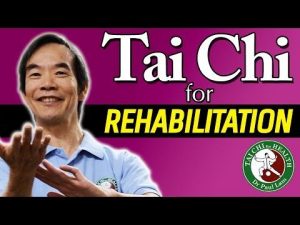 FREE Tai Chi for Rehabilitation (TCR) to help you boost your immunity and reduce stress and anxiety. Dr Paul Lam of the Tai Chi for Health Institute is offering the entire TCR online learning programme free of charge.
FREE Tai Chi for Rehabilitation (TCR) to help you boost your immunity and reduce stress and anxiety. Dr Paul Lam of the Tai Chi for Health Institute is offering the entire TCR online learning programme free of charge.
Click on this link for Lesson one (just over one hour’s duration). We suggest you jump straight to the 48-minute point of the link below to learn the 1st two wonderful steps of TCR. After that, you can watch the rest of the video for juicy and fascinating information from Dr Lam on why and how TCR works. Subsequent lessons in the series will be available in due course.
I (Jocelyn Watkin) am a qualified, board-certified and premier instructor for the Tai Chi for Health Institute. My instructor course for TCR was with Dr Lam himself.
by Jocelyn Watkin | Feb 4, 2020 | Information
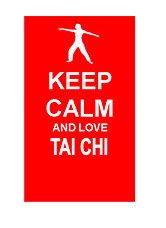 Please note: This is a post from February 2020.
Please note: This is a post from February 2020.
If the year already feels likes it is passing in a blur, then tai chi could be for you. At Kia Ora Tai Chi, we can teach you techniques that will help slow things down, relieve and release stress, while increasing your fitness and well-being.
If this sounds like something you want then the team at Kia Ora Tai Chi would love to hear from you. We are looking for adults of any age and ability, who are keen to make a regular commitment to learning tai chi.
To find out if tai chi is for you, please come along to one or both of the free sessions on Monday 17th and Wednesday 19th February, 2020, 6.30-7.15pm, in Manurewa.
To RSVP or to ask questions about the classes, please use the Contact Form
Learning these proven tai chi techniques to clear and calm your mind won’t happen overnight. After the free sessions, you’ll need to make a commitment to attend classes once per week.
Cost of classes: The classes on the 17th and 19th February 2020 are FREE. After that, prices start from $9.50 per class. A discount is available for those who are referred by ACC and Age Concern for the Community Group Strength and Balance Exercise programme (“Live Stronger for Longer”). You must be aged 65+ to be referred.
What to wear: Please wear loose comfortable clothing and flat-soled shoes (such as sneakers, trainers or tennis shoes). Please also bring a drinking bottle of water.
Here at Kia Ora Tai Chi, we are all constantly amazed at the health improvements that our students tell us about once they attend our classes on a regular basis:
- sleeping better at night
- feeling better all over and less stressed
- improved breathing, with less wheezing or feeling like they’ve ‘run out of breath’
- finding it easier to go up and down stairs
- playing with their children or grandchildren for longer without getting tired
- lowering their high blood pressure
- feeling more flexible and moving better with less aches and pains
- better balance/less falls
- toned muscles.
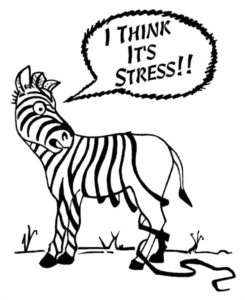
Learn how to reduce stress with tai chi
There have been hundreds of clinical studies over many years that confirm the health benefits of tai chi, especially for the Tai Chi for Health programmes that we teach at Kia Ora Tai Chi. You can read more about these clinical studies here.
One aspect consistent across all studies and trials is that none of these benefits happen overnight or after just one class. The trials take place over several weeks, sometimes several months, and the people being studied do tai chi at least 2 -3 times per week.
Most of our students attend at least one class per week, often two, and several practice between each class.
We are now looking for a group of new beginners who accept that their health and well-being is worth a regular commitment to tai chi.
Find out more about Kia Ora Tai Chi classes, how to get to the venue, and what to expect.
Discover more health benefits from tai chi.
Want to know even more about tai chi? Click here
Please RSVP for the free classes on the 17th and 19th February 2020 by using the Contact Form. You are welcome to attend one one or both of these classes.
Come along and say kia ora. We’d love to see you. We’re a friendly bunch at a great venue that has lots of free parking.
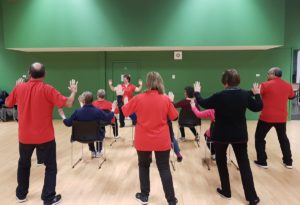
A Kia Ora Tai Chi class
by Jocelyn Watkin | Dec 8, 2019 | Information
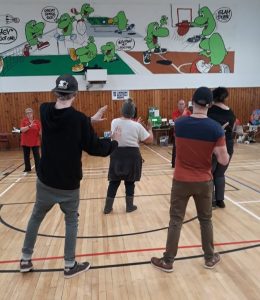
The Kia Ora Tai Chi team teaching tai chi the “He Aha Te Hauora? What the Health?” Expo in Manurewa
Most of us know that exercise can help to reduce stress and boost your mood.
Tai chi is one of the best, but probably also the most underrated exercise for stress relief and improvement in your overall health. This is possibly because it doesn’t seem to fit the Western world’s obsession with the need to ‘go hard’ or, worse, the mantra of ‘no pain/no gain’.
Tai chi works for stress relief and for many other health-related issues because it combines low-impact movements with meditation for a body-mind workout.
Dee Ogilvy, who has practiced tai chi for more than 20 years and now runs her own tai chi programme, while also teaching it as a part of Missouri State University’s Employee Wellness Program, says: “tai chi’s positive effects on our mind is mostly thanks to the meditation component of the exercise”.
A small study published in Psychoneuroendocrinology reported that brief mindfulness meditation (three x 25-minute sessions) minimised psychological stress. Ogilvy notes that the effects are even greater when movement and meditation are paired together — having to be present and focus on your movements and breathing helps bring on the relaxation.
Studies have also shown that tai chi can improve the quality of your sleep, improve cardio function, and, for older adults, can have positive effects on cognitive function and memory.
Testimonial on the calming, peaceful effects of tai chi during the “He Aha Te Hauora? What the Health?” Expo at the Manurewa Leisure Centre on 21 June 2019:
“Kia Ora Tai Chi was at the Expo! Jocelyn, Pat and Jeff led us in a demonstration. Tai chi is an incredibly powerful practice for your wellbeing. When they started the energy of the room shifted to a more peaceful vibe. It was magical.”
Testimonial from Edith of Drive Consumer Direction Counties Manukau
Note: Drive Consumer Direction Counties Manukau is a network that represents the interests of people in the Counties Manukau region who experience mental health and/or addiction challenges.
Discover more:
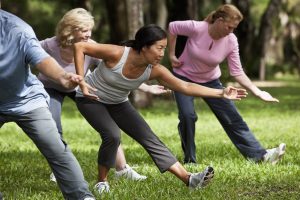

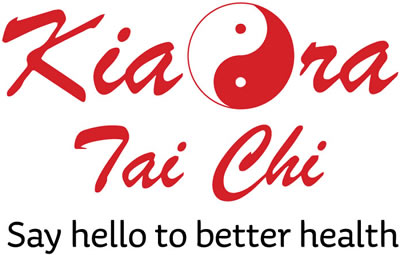
 Breathing – we all do it automatically: approximately 18 times per minute, 1,080 times per hour and nearly 26,000 times in a 24-hour day. You would have thought we’d got it down to a fine art?
Breathing – we all do it automatically: approximately 18 times per minute, 1,080 times per hour and nearly 26,000 times in a 24-hour day. You would have thought we’d got it down to a fine art? FREE Tai Chi for Rehabilitation (TCR) to help you boost your immunity and reduce stress and anxiety. Dr Paul Lam of the Tai Chi for Health Institute is offering the entire TCR online learning programme free of charge.
FREE Tai Chi for Rehabilitation (TCR) to help you boost your immunity and reduce stress and anxiety. Dr Paul Lam of the Tai Chi for Health Institute is offering the entire TCR online learning programme free of charge. Please note: This is a post from February 2020.
Please note: This is a post from February 2020.


